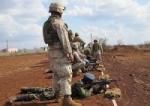BENGHAZI, Libya — The attack seemed to have come out of clear skies onto a field of wildflowers.
Littered across the landscape, some 30 miles south of Benghazi, the detritus of the allied airstrikes on Saturday and Sunday morning offered a panorama of destruction: tanks, charred and battered, their turrets blasted clean off, one with a body still caught in its remnants; a small Toyota truck with its roof torn away; a tank transporter still on fire. But it did not end there.
For miles leading south, the roadsides were littered with burned trucks and burned civilian cars. In some places battle tanks had simply been abandoned, intact, as their crews fled. One thing, though, seemed evident: the units closest to Benghazi seemed to have been hit with their cannons and machine guns still pointing towards the rebel capital.
To the south, though, many had been hit as they headed away from the city in a headlong dash for escape on the long road leading to a distant Tripoli.
“They were retreating,” said Col. Abdullah al-Shafi, an officer in the rebel forces which had clamored desperately for the help that arrived on Saturday. “Soldiers had taken civilians cars and fled. They were ditching their fatigues.”














Bookmarks